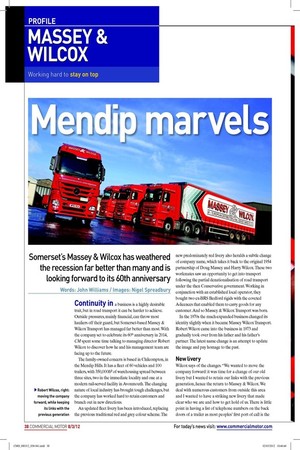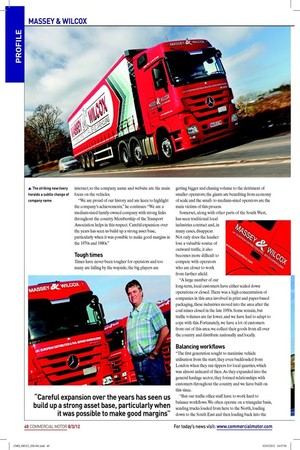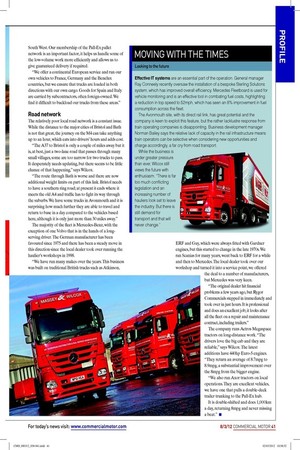Mendip marvels
Page 27

Page 29

Page 30

If you've noticed an error in this article please click here to report it so we can fix it.
Somerset’s Massey & WiLcox has weathered the recession far better than many and is Looking forward to its 60th anniversary
Words: John Williams / Images: Nigel Spreadbury
Continuity in a business is a highly desirable trait, but in road transport it can be harder to achieve. Outside pressures, mainly inancial, can throw most hauliers off their guard, but Somerset-based Massey & Wilcox Transport has managed far better than most. With the company set to celebrate its 60th anniversary in 2014, CM spent some time talking to managing director Robert Wilcox to discover how he and his management team are facing up to the future.
The family-owned concern is based in Chilcompton, in the Mendip Hills. It has a leet of 60 vehicles and 100 trailers, with 350,000ft2 of warehousing spread between three sites, two in the immediate locality and one at a modern rail-served facility in Avonmouth. The changing nature of local industry has brought tough challenges, but the company has worked hard to retain customers and branch out in new directions.
An updated leet livery has been introduced, replacing the previous traditional red and grey colour scheme. The new predominately red livery also heralds a subtle change of company name, which takes it back to the original 1954 partnership of Doug Massey and Harry Wilcox. These two workmates saw an opportunity to get into transport following the partial denationalisation of road transport under the then Conservative government. Working in conjunction with an established local operator, they bought two ex-BRS Bedford rigids with the coveted A-licences that enabled them to carry goods for any customer. And so Massey & Wilcox Transport was born.
In the 1970s the much-expanded business changed its identity slightly when it became Massey Wilcox Transport. Robert Wilcox came into the business in 1973 and gradually took over from his father and his father’s partner. The latest name change is an attempt to update the image and pay homage to the past.
New livery
Wilcox says of the changes. “We wanted to move the company forward: it was time for a change of our old livery but I wanted to retain our links with the previous generation, hence the return to Massey & Wilcox. We deal with numerous customers from outside this area and I wanted to have a striking new livery that made clear who we are and how to get hold of us. There is little point in having a list of telephone numbers on the back doors of a trailer as most peoples’ irst port of call is the internet; so the company name and website are the main focus on the vehicles.
“We are proud of our history and are keen to highlight the company’s achievements,” he continues. “We are a medium sized family owned company with strong links throughout the country. Membership of the Transport Association helps in this respect. Careful expansion over the years has seen us build up a strong asset base, particularly when it was possible to make good margins in the 1970s and 1980s.”
Tough times
Times have never been tougher for operators and too many are falling by the wayside; the big players are getting bigger and chasing volume to the detriment of smaller operators; the giants are beneiting from economy of scale and the small to medium sized operators are the main victims of this process.
Somerset, along with other parts of the South West, has seen traditional local industries contract and, in many cases, disappear. Not only does the haulier lose a valuable source of outward trafic, it also becomes more dificult to compete with operators who are closer to work from further aield.
“A large number of our long term, local customers have either scaled down operations or closed. There was a high concentration of companies in this area involved in print and paper based packaging, these industries moved into the area after the coal mines closed in the late 1950s. Some remain, but trafic volumes are far lower, and we have had to adapt to cope with this. Fortunately, we have a lot of customers from out of this area; we collect their goods from all over the country and distribute nationally and locally.
Balancing workflows
“The irst generation sought to maximise vehicle utilisation from the start, they even backloaded from London when they ran tippers for local quarries, which was almost unheard of then. As they expanded into the general haulage sector, they formed relationships with customers throughout the country and we have built on this since.
“But our trafic ofice staff have to work hard to balance worklows. We often operate on a triangular basis, sending trucks loaded from here to the North, loading down to the South East and then loading back into the South West. Our membership of the Pall-Ex pallet network is an important factor, it helps us handle some of the low-volume work more eficiently and allows us to give guaranteed delivery if required.
“We offer a continental European service and run our own vehicles to France, Germany and the Benelux countries, but we ensure that trucks are loaded in both directions with our own cargo. Goods for Spain and Italy are carried by subcontractors, often foreign-owned. We ind it dificult to backload our trucks from these areas.”
Road network
The relatively poor local road network is a constant issue. While the distance to the major cities of Bristol and Bath is not that great, the journey on the M4 can take anything up to an hour, which eats into drivers’ hours and adds cost.
“The A37 to Bristol is only a couple of miles away but it is, at best, just a two-lane road that passes through many small villages, some are too narrow for two trucks to pass. It desperately needs updating, but there seems to be little chance of that happening,” says Wilcox.
“The route through Bath is worse and there are now additional weight limits on part of this link. Bristol needs to have a southern ring road; at present it ends where it meets the old A4 and trafic has to ight its way through the suburbs. We have some trucks in Avonmouth and it is surprising how much further they are able to travel and return to base in a day compared to the vehicles based here, although it is only just more than 30 miles away.” The majority of the leet is Mercedes-Benz, with the exception of one Volvo that is in the hands of a longserving driver. The German manufacturer has been favoured since 1975 and there has been a steady move in this direction since the local dealer took over running the haulier’s workshops in 1998.
“We have run many makes over the years. This business was built on traditional British trucks such as Atkinson, ERF and Guy, which were always itted with Gardner engines, but this started to change in the late 1970s. We ran Scanias for many years, went back to ERF for a while and then to Mercedes. The local dealer took over our workshop and turned it into a service point, we offered the deal to a number of manufacturers, but Mercedes was very keen.
“The original dealer hit inancial problems a few years ago, but Rygor Commercials stepped in immediately and took over in just hours. It is professional and does an excellent job; it looks after all the leet on a repair and maintenance contract, including trailers.” The company runs Actros Megaspace tractors on long-distance work. “The drivers love the big cab and they are reliable,” says Wilcox. The latest additions have 440hp Euro-5 engines. “They return an average of 8.7mpg to 8.9mpg, a substantial improvement over the 8mpg from the bigger engine.
“We also run Axor tractors on local operations. They are excellent vehicles, we have one that pulls a double-deck trailer trunking to the Pall-Ex hub.
It is double-shifted and does 1,000km a day, returning 8mpg and never missing a beat.” ■
MOVING WITH THE TIMES
Looking to the future Effective IT systems are an essential part of the operation. General manager Ray Conneely recently oversaw the installation of a bespoke Sterling Solutions system, which has improved overall efficiency. Mercedes Fleetboard is used for vehicle monitoring and is an effective tool in combating fuel costs, highlighting a reduction in top speed to 52mph, which has seen an 8% improvement in fuel consumption across the fleet.
The Avonmouth site, with its direct rail link, has great potential and the company is keen to exploit this feature, but the rather lacklustre response from train operating companies is disappointing. Business development manager Norman Bailey says the relative lack of capacity in the rail infrastructure means train operators can be selective when considering new opportunities and charge accordingly, a far cry from road transport.
While the business is under greater pressure than ever, Wilcox still views the future with enthusiasm. “There is far too much conflicting legislation and an increasing number of hauliers look set to leave the industry. But there is still demand for transport and that will never change.”








































